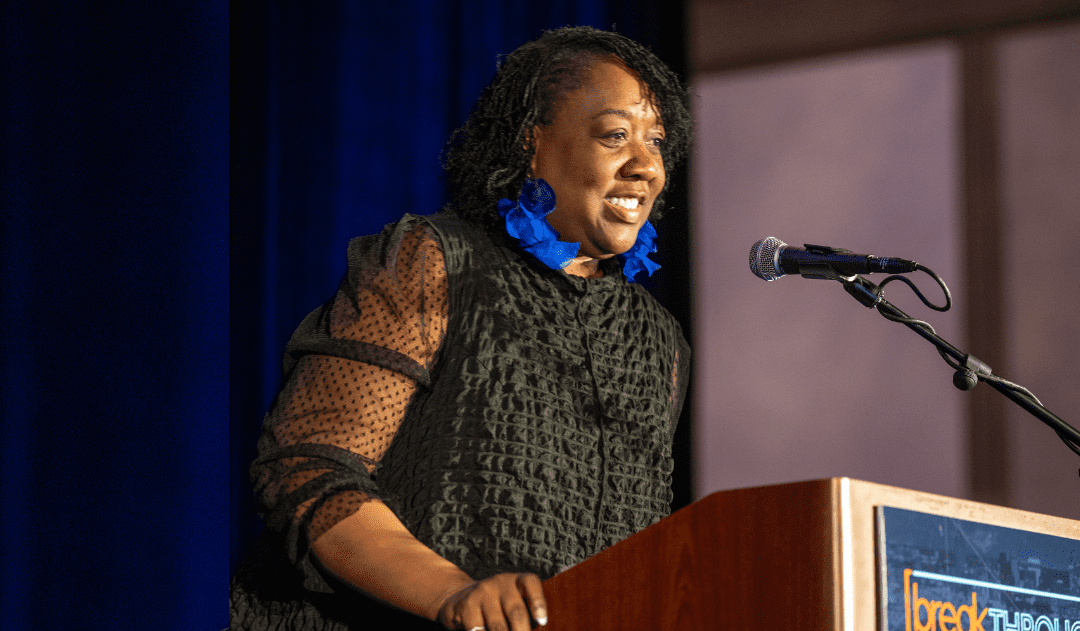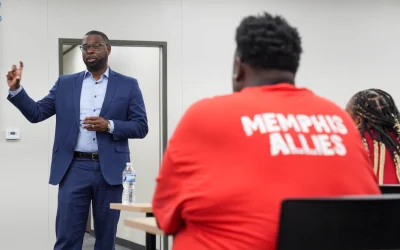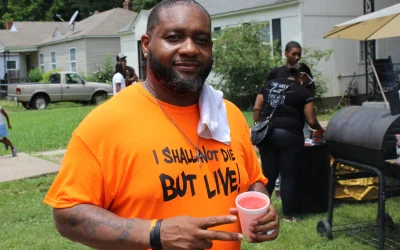For partner organizations, the pattern of change has started
Ephie Johnson, president and CEO of Neighborhood Christian Centers, Inc., was a co-host of the first Breakthrough Conference in 2023. She liked what the national speakers on community violence intervention, or CVI, had to say. And she appreciated the effort to bring organizations together in one place.
“It was well done,” she said. Neighborhood Christian Centers is a collaborative service provider, offering direct services and case management support to participants in Memphis Allies’ SWITCH – Support With Intention To Create Hope – community violence intervention program as a partner in Memphis Allies.
As Breakthrough 2024 was winding down, Johnson was inspired by changes that made this convening of community groups more interactive.
On day two of the conference, people from various organizations – some of whom had never spoken to one another before – were seated together discussing the future.
It felt to Johnson like a change was already beginning.
“This year has been very intentional… the second day being practitioner driven made it very engaging,” Johnson said, as she sat at a table at Hilton Memphis. “This is a large room, but it feels small because of the engagement.”
Breakthrough 2024 – with the theme “recharge, realign, reimagine” – was co-hosted by Memphis Allies, Neighborhood Christian Centers, Inc., I Shall Not Die But Live!, Lifeline To Success, LeBonheur Children’s Hospital, Crime Victims & Rape Crisis Center and the University of Tennessee Health Science Center.
The conference also had national speakers: Anthony Smith, executive director of Louisville-based Cities United; and Arne Duncan, founder of Chicago CRED, a community violence intervention initiative, and a former secretary of education to President Obama.
Johnson appreciated hearing from those experts, too. But even more important, she says, is that the local people who needed to be present were here.
“Because major (community violence) intervention programs are trying to make something happen, there’s hope,” she said. “If nothing is happening, there is no hope.
“So, Memphis Allies, Heal 901, GVIP (the city’s Group Violence Intervention Program), 901 BLOC Squad, it was really cool they were all represented here at the conference.”
‘One table’
In sum: Memphis people needed to connect with Memphis people. No matter how good the national speakers.
“I think a lot of times when you’ve got national experts saying, ‘Well, we did this in L.A.,’ it can be like, ‘Well, that’ll never happen in Memphis.’ And that can be a little discouraging,” said Sandy Bromley, who is deputy director of Justice Programs for the Shelby County Division of Community Services and was a conference presenter.
Bromley led a session where conference attendees broke up into groups and worked together to build their own hypothetical programs around one aspect of violence reduction work. Shelby County District Attorney Steve Mulroy even participated with one of the groups.
Smith, in his keynote at the conference’s start, had mentioned the importance of communities creating “one table” to prevent overlap and the wasting of valuable time and resources.
Day two of the conference went straight to that point.
“That’s something that’s not happening right now,” Bromley said of Greater Memphis. “So, we started to learn that we’re collaborating but collaborating differently instead of just that one table that Anthony Smith talked about.
“That’s something we’re going to have work on over this next year.”
‘Put down the arms’
Susan Deason, executive director of Memphis Allies, which reaches adults through its SWITCH program, and teenagers through SWITCH Youth, says conference attendees discovered just how much they have in common.
One thing binds us all together. We’re all still learning and trying to get this right.
– Susan Deason
In fact, Duncan likened competition among nonprofits to the competition in the streets among rival gangs: “Put down the disagreements, put down the arms about anything but results.”
And then Duncan added a not so small point: “(Funding) flows to success.”
Also required for success: Nonprofits without a previous community violence intervention history being open to where they might fit within the public safety landscape.
That is the approach taken by Neighborhood Christian Centers.
“Gun violence was so specific that we had to broaden our mindset to understand how we could serve as a social service agency,” Johnson said. “The entire marketplace, as citizens, as providers … whatever we are.”
What they are now – along with everyone else concerned enough to attend Breakthrough 2024 – is engaged with a process that can’t have too many hands-on helpers.
For there’s no time like the present to begin making a difference.
“It takes a generation of time to change a community in a way that not only will be comprehensive, but lasting,” Johnson said. “It has to start now so our next 25 years we can look back and say, ‘OK, it didn’t happen immediately, but if we did not speak up and say let’s do something, then we’d be 25 years later than we are.’”
More Posts
Memphis sees dramatic drop in homicides — outpacing national trends in new FBI report
FOR IMMEDIATE RELEASE CONTACT: Crissy Lintner, Director of Public Relations, Youth Villages901-461-3139 | Crissy.Lintner@youthvillages.org Memphis sees dramatic drop in homicides—outpacing national trends in new FBI reportLeading CVI program credits collaborative...
Mayor Young’s Message to Memphis Allies Staff
Memphis Mayor Paul Young recently visited the Hickory Hill office to express his support for the daily gun violence intervention work being done by Memphis Allies' frontline staff Mayor Young shares message with Memphis Allies front-line staff In the aftermath of the...
Engaging One Block at a Time
Image above: Renardo Baker, founder of “I Shall Not Die But Live!” Memphis Allies and partners: Engaging one block at a time Memphis Allies’ mission to reduce gun violence is carried out daily by going into the city’s neighborhoods. Sometimes when there is trouble,...




